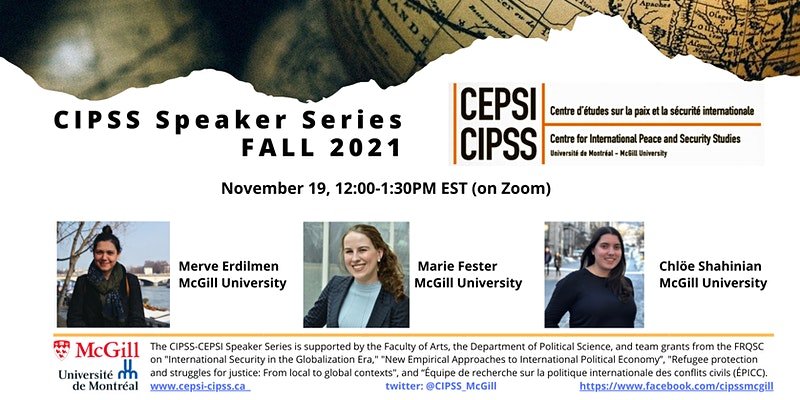CIPSS Student Speakers
About this event
Speakers:
Merve Erdilmen, PhD , McGill University
Turning Perspectives on Global Governance Upside Down: Gender Mainstreaming Practices of Refugee-Led Organizations in Turkey
Abstract: The displacement of refugees and growing feminization of forced migration have become increasingly pronounced global governance challenges. Parallel to the increasing number of displaced persons, there have been important global efforts to advance gender mainstreaming, meaning the promotion of gender equality and fighting gender-driven marginalization through the integration of gender perspectives into the preparation, design, implementation, and monitoring of a wide range of policies. Gender mainstreaming remains a critical issue in relation to refugees in particular as gender mainstreaming policies have contributed to longstanding helper-victim binary in humanitarian responses to displacement, and hence have neglected refugees’ agency in shaping and challenging gendered power asymmetries embedded in the global refugee regime. Similarly, current global governance studies provide limited understanding of how “vulnerable” groups, such as refugees, function as actors within global governance systems; how their power is exercised; and who gets counted as actors in global governance. Building on and contributing to insights from international practice theory (IPT) as well as feminist scholarship, this work reconceives refugees as practitioners of global governance. It does so by examining the complex roles of refugees in gender mainstreaming efforts in Turkey—now the largest refugee hosting country in the world. Overall, this project seeks to examine practices of gender mainstreaming from the perspective of refugees, who most often received limited recognition as actors in global governance. By investigating the gender mainstreaming practices of refugee-led organizations in Turkey, it challenges elitist and gender-blind tendencies in international relations scholarship.
Merve Erdilmen is a PhD candidate in Political Science with a Gender Studies Specialization at McGill University and works under the supervision of Megan Bradley. She is a research assistant for Durable Solutions Cluster at Local Engagement Refugee Research Network (LERRN) and consultant for International Organization for Migration (IOM). She also worked as a research associate at GLOBALCIT at the European University Institute on an international project on statelessness and birthright citizenship. Her research focuses on the relationship between gender, shelter, access to health care, and livelihoods for refugees in the Middle East. Her current project aims to understand the ways in which various actors, including international organizations, civil society, refugee-led organizations, grass roots, and municipalities, implement and practice global gender norms in Turkey.
Marie Fester, MA, McGill University
When the going gets tough: the political economy of who runs for office
Abstract: A growing body of research shows that trade liberalization with China had a profound effect on American voters via deindustrialization. The effect of NAFTA and permanent normal trade relations with China are important factors for understanding changes in American politics over the last two decades. Trade shocks particularly affect unemployment and poverty rates, but also have gendered effects. This paper will assess the impact of trade shocks on the supply of women candidates for Congress. Since the surge in congresswomen in the ‘Year of the Woman’ (1992), growth of descriptive representation for women has been slow and concentrated within the democratic party. Previous research attributes less representation in part two women’s greater risk aversion or dislike for competition and pipeline effects – lower representation of women in careers that typically lead to politics. Literature on candidate emergence has also shown that women are more likely to run when they care about a specific policy issue. Furthermore, the literature on economic recessions has shown that women are more likely to participate in the labor force counter cyclically. I argue that trade shocks – due to their intensity – induce greater political engagement among women which should lead to an increase in women candidates in congressional elections.
Marie Fester is a second year MA student in the Department of Political Science at McGill University. Her BA, also from McGill, is a first class honours political science with a minor economics. Marie is particularly interested in how gender influences paths to domestic and international leadership roles and the impact of leadership in the major multilaterals. Her thesis research focuses on how economic shocks impact the number of women in US congressional elections. Her research is supported by the Joseph Armand Bombardier scholarship (SSHRC CGS M).
Chlöe Shahinian, McGill University
Assessing the relationship between the use of force and local perceptions of “operational legitimacy” in United Nations Peacekeeping Operations
Abstract: The 2015 report of the United Nations (UN) High-Level Independent Panel on Peace Operations highlights challenges in achieving UN Peacekeeping Operation (PO) operational goals in contexts which are marked by heightened violence and the absences of viable peace processes. Implementing POs in these contexts, referred to as “conflict management” by the UN in the report, raises questions about the role of the use of force in UN POs. The role of the use of force in POs also relates to a burgeoning body of scholarship which studies legitimacy in peacekeeping, and which questions the ways in which UN POs might undermine their own local legitimacy in the regions in which they operate. This project coins a new type of legitimacy in the study of POs, operational legitimacy, which is the perceived appropriateness of the means through which a UN PO operationalizes its mandate responsibilities. The goals of this research project are to investigate, firstly, whether the use of force by UN POs weakens the local operational legitimacy of those operations; and then, secondly, to explore how the use of force within the scope of UN POs specifically weakens the local operational legitimacy of those operations, if a decline in perceived operational legitimacy is observed. The current research design consists of a qualitative methodology which will focus on case studies of two ongoing UN POs taking on roles of conflict management: MINUSMA (Mali) and MONUSCO (Democratic Republic of the Congo). Gaining a greater understanding of the consequences of the use of force by those POs implicated in contexts of conflict management is especially important in regards to the project’s impact in light of the fact that the UN itself expects to be operating more POs in situations which might be characterized as conflict management in the near future.
Chlöe Shahinian is a second-year Master’s student studying Political Science, with a specialization in International Relations. She completed her Bachelor’s degree at McGill University in 2020, where she majored in Honours Political Science and minored in European Literature and Culture. Chlöe is a recipient of the McGill Department of Political Science’s Guy Drummond Fellowship and is a Canada Graduate Scholarship - Master’s award-holder (SSHRC). Chlöe’s research interests include international law, with a focus on international human rights law and state incentives to comply (or not to comply) with international treaties in the human rights regime, and the work of international organizations, with a specific focus on United Nations Peacekeeping efforts.
*Please note that this is an online event and will take place on Zoom. If you wish to attend this event, please register to see the Zoom link in the confirmation email.


